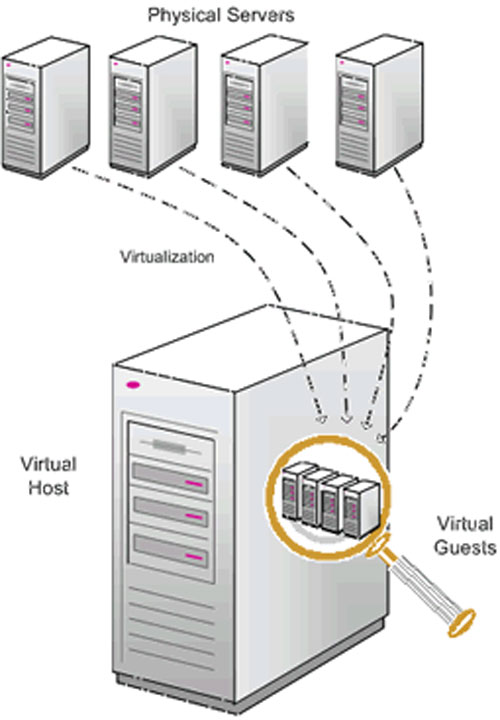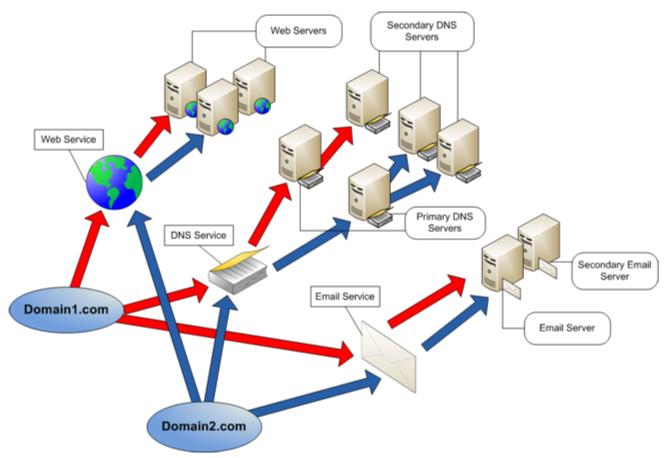Web hosting is a business of rendering web services, maintenance of servers, file management and server space for websites that are operated by companies or individuals who do not have their own web servers. Web hosting providers generally take care of the tedious issues like running and supervising the computers while you design and build your site. There are different types of hosting available meant for different types of websites.
With the outgrowth of the number of different web hosting alternatives, a web user usually finish up making a hastened decision. Your choice should depend upon what you want to carry out with your website. Some web hosting services are free, but place advertisements on web sites. Whereas other web hosting types can be more expensive, but provide a lot more assistance and bandwidth. Before getting a web hosting provider, it is essential to understand the basics of web hosting.
Shared Hosting
Shared hosting is the most popular and the cheapest website hosting method where many sites are hosted by different clients on the same physical host to share resources. The resources are things like RAM, CPU, and other parts of the server that run your site. In addition, the host provides system administration and does not require any technical expertise. But at the same time provides users with lesser bandwidth and a restricted storage space. Your content and applications are placed on a server which is shared with other customers who also use that web host. It is important to survey the control panel which the hosting company provides you. Shared hosting has its limitations. It restricts you from using some scripting languages and applications, although you are often permitted to customize and add features such as a shopping cart or an online catalogue.

Shared web hosting is idealized for setting up simple websites, web blogs, personal web pages, small forums, small business and e-commerce sites. The majority of paid web hosting services are shared web hosting.
Virtual Private Server (VPS)
Succeeding shared hosting, virtual private servers are becoming the foundation among many web hosts. Virtual hosting gives the impression that you have your own dedicated server with all the resources for yourself. In fact, the server hosts various other users, but splits the main server into several virtual servers. The server is divided into sections for each person who has a site on there and you may be able to have root access to control your part of the server. Each virtual server can run its own fledged operating system, and each server can be independently rebooted.

Virtual Dedicated Server provide many of the capabilities and features of dedicated servers, including admin access and dedicated IP addresses, but at a much lower price. These servers come with a user-friendly control panel that offers a highly powerful tool box that allows you easy access to powerful features. Shared hosting can be kind of a closed environment and with virtual private servers you will get a more customizable solution.
A virtual server can be used for a wide variety of purposes, including gaming, virtual hosting, and hosting of traffic-intensive websites. This kind of web hosting is often utilized by medium-sized companies or individuals that want a little more control over the server.
Dedicated Hosting
Dedicated hosting is a hosting plan where you hire a server that is not shared with anyone else and is used all by yourself. You are the master of this elastic kind of hosting service supplied with the authority to use all the resources and host multiple websites, responsible for its security and reliability but you do not own it. There is no shift of assets or personnel to the web host. This hosting helps websites that have a lot of traffic, need a large amount of disk space, has secure, high quality physical infrastructure, fast internet connectivity and allows CPU-intensive applications to run smoothly. Dedicated servers are most often housed in data centers catering redundant power sources and HVAC systems. The hosting company carries off the hosting operations, equipment and connectivity, while business processes, strategic direction and debugging applications have to be managed by the customer.
A dedicated server is aimed at being a hosting solution for major online businesses, with an extremely powerful computer/server, medium to large companies or individuals that want full control over their server.
There are two types of dedicated hosting; Unmanaged and Managed. Important to think about when deciding on dedicated hosting is whether you want it to be managed or unmanaged.
-
Managed Hosting
Managed hosting service is an advanced version of web hosting and the most expensive hosting alternative. This is alike dedicated hosting but the difference is that you do not have control of the actual server. The web host handles your server for you, controls the security, root access, and reliability of the actual server. Managed dedicated servers are good if you only want the basics and do not handle anything else than the onsite content. The managed hosting provider accepts the responsibility of hosting the client’s website in a well managed way. Managed hosting firms can also help businesses switch their network and systems, upgrading, adding options and extending solutions. This helps to prevent configuration problems which could crash the server.
-
Unmanaged Hosting
In unmanaged dedicated web hosting, you are an administrator responsible for configuring and maintaining the server and for keeping the server hacker free by keeping up to date software on it. This grants the user the large amount of control and flexibility. As many people do not know about handling the task of being a server administrator, therefore, this is not a practicable choice for some. While the unmanaged server is less expensive, it does call for Unix knowledge and the time to maintain and configure the server. If you or anyone else in the company has the required technical knowledge, you can pick unmanaged dedicated hosting.
Colocation Hosting
Colocation Hosting provides you with the space to use the server, electrical support and internet connection for the server but the actual Colocation server is yours. Colocation web hosting is the most expensive web hosting service available. The host does not provide much in the way of support or maintenance of the server. Typically a person would have to go to the actual datacenter to maintain the server. A good Colocation web hosting service is more expensive than the other types of hosting, but for businesses, it is cheaper than hosting their servers in-house.
Ecommerce Hosting
Ecommerce web site hosting entails to provide ecommerce-hosting solutions when hosting a web site. Ecommerce web hosting provides several helpful features to facilitate business transactions easily over the internet and permits people to shop online via means of their credit card. Companies that allow for ecommerce hosting give their clients very high security options SSL support, database access, and often times even the shopping cart software is included in the hosting account’s feature set. It also involves intensified levels of performance and reliability.
Grid Hosting
Grid hosting is a bunch of websites all sharing a bunch of servers rather than a couple of websites sharing one server. It is the application of computer resources from multiple administrative domains applied to a problem that needs access to a large number of computing cycles or the need to process large amounts of data. Grid hosting is highly scalable just because the computers containing the grid are basically complete units. Much like clustered hosting, grid hosting makes it less convincing that a spike in resource needs will take your site offline.
Reseller Web Hosting
Reseller hosting allows customers to become hosts themselves. It is a strategic type of web hosting where you buy server space, market it yourself, and then sells it to other users online. The accounts distributed will vary consorting to the needs of the other users and each web page will be furnished with an individual name. These sort of hosting services work in combination with other types of hosting schemes. Most of the resellers are web designers, entrepreneurs, advisors or marketers, who want to offer their customers a complete package with hosting included.
Free Web Hosting
Free web hosting is the simplest kind of web hosting offered entirely free to users to upload a certain amount of content in the web with some level of customization. This type of web hosting is normally endorsed by advertisements on hosted web sites to yield profit. This is great for students, teenagers, beginners hosting their first website or making a website for personal use that do not usually require too much data to support its functions but not for those who want a website beyond a single page. Web host offer users with a tutorial to guide them as they are starting and these directions are really easy to understand. The type of domain one is allotted in free web hosting is typically a subdomain or a directory. Characteristics for this type of web hosting are confined. Most free web hosts do not have support for MySQL, multiple e-mail accounts, and PHP.
Clustered Hosting
Clustered hosting is a group of servers clustered in the same network hosting the same content for better resource usage, increasing accessibility and you also benefit from several other services. The aim of clustered hosting technology is to eliminate the troubles inherent in regular shared hosting infrastructures and provides users better resources to be able to run their web pages. On a single hosting, if a reboot is required, it stops operating for sometime; whereas in clustered hosting, the service is always available. Many of the large websites use this form of hosting, as downtime is absent in this set up. It is almost like cloud hosting, where the resources of various servers are made available for a website to use when the need arises.

Root Server Hosting
Another name for Root Server hosting is semi-managed hosting letting you to access the root of the server itself, while offering various benefits, such as authentic infrastructure, security and upkeep of hardware. Root Server hosting gives continuous internet connectivity and higher degree of flexibility for you to choose operations systems and hardware specifications most desirable for your needs. The hosting provider handles the installation and hardware but you manage all other facets of it, including backups and software upgrades. Root Server demands more specialized skills, but it's a very flexible and versatile form of hosting, that allows you to customize your server to your exact prerequisites.
Green Hosting
Green or Eco-friendly website hosting is eco-friendly and is a new addition in hosting services arising in popularity. Eco-friendly hosting company endeavors to prove that they are not having any negative affect on the environment in an effort to draw consumers. The web host either buys carbon offsets or use eco-friendly energy timesaving servers. Green hosting wants to do something for the environment and only requires shared hosting for your website.
Regardless of what hosting type you prefer, package options will alter from company to company. It is recommended that you consider the purpose of the web site and what one’s capabilities are and take your time to study what will best suit your needs and then take your decision, so as to make certain you get your money's worth. For smaller sites choose a fixed monthly rate. Prices will vary for each type of host dependant upon space you need, the support, reliability, features, and security. Look for a host that offers a few different packages. You may need to upgrade afterwards. Make sure that you check the fine print for additional billings and fees each month. Occasionally you will be charged a startup fee besides your monthly tolls.
Picking out a type of web hosting might appear like a scaring job, but simply doing research and making a knowledgeable decision should give in satisfaction and success on this crucial matter.